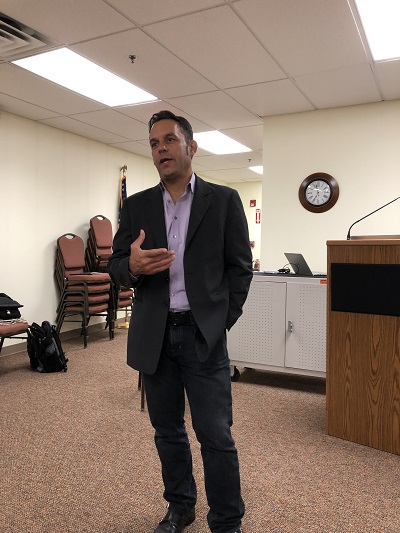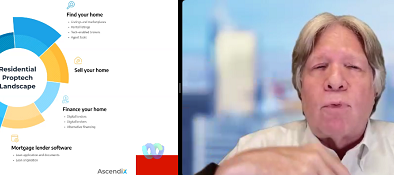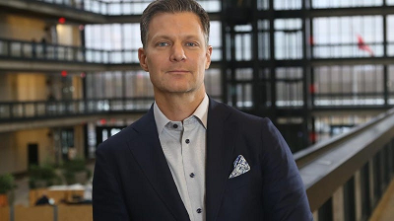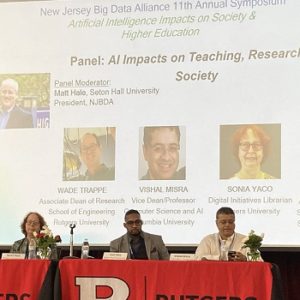Blockchain in Hollywood Explored at Morris Tech Meetup
Blockchain has gone Hollywood! That’s what an independent filmmaker and a blockchain expert told the audience at a recent Morris Tech Meetup.
Henning Morales, a filmmaker, author and motivational speaker, and Lindsley Medlin, founder of NJ Blockchain Center (Raritan), discussed the impact of blockchain technology on the movie industry at the Morris Tech event on September 11, in Chatham. They told the audience that blockchain could transform the way movies are made, distributed, marketed and seen.
Blockchain is defined as a distributed ledger that puts transactions into groups (blocks) that are linked together, using cryptography to secure them. It’s commonly regarded as the underlying technology of the highly volatile cryptocurrency market, but it has unlimited applications for many industries, including filmmaking.
Morales, who showed the audience an unreleased movie short depicting his life as a troubled teenager growing up in northern New Jersey, plans to use blockchain technology in his filmmaking. “Our intention is to put everything on blockchain to maximize the benefits,” he said.
Using blockchain will improve the tracking of money generated by the viewers watching his flicks, Morales said. This will play a key role in the films’ revenue-sharing model, which would be used to compensate social-media influencers for their part in promoting the movies to their large “tribes” of followers.
Morales’ planned films will be based on real-life situations with inspirational messages. “We want to tell true stories and get away from the fantasy [movies] that young people are being exposed to.”
The film industry is ideally suited for blockchain, as this business is viewed as the least transparent and most reliant on middlemen in the entertainment world, he said.
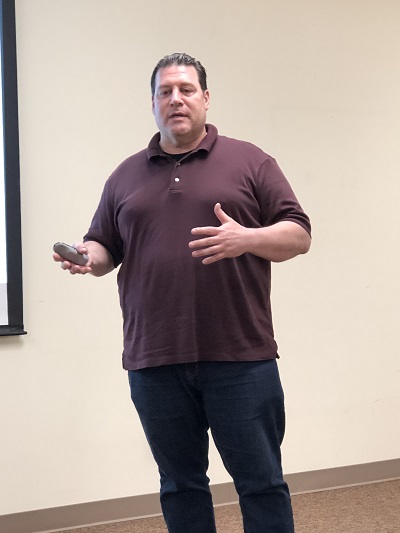
Blockchain will enable investors, filmmakers, talent and others to get a clearer view of how money is spent on a movie. Over the years, Hollywood bean-counters have been accused of using murky and questionable accounting practices in the financing and distribution of movies. “In an industry rife with accounting deception, this would be a welcome improvement,” said Medlin.
Besides giving smaller, independent filmmakers more control over how their movies are made and distributed, said Medlin, blockchain could also eliminate middlemen, who may be “taking a disproportionally large share of the profits.”
Blockchain also could be used for crowd-funding movie projects, replacing the more conventional method of raising funds from a few large investors. One recent example of this form of democratization of moviemaking is actor Wesley Snipes’ plans to launch a $25 million fund that will allow fans and others to help finance films and share in the profits.
The technology also would reduce the unlawful copying and distribution of movies by giving filmmakers greater control over the distribution and viewing of digital copies of their films.
That’s because blockchain creates a “digital uniqueness,” meaning that items created in the digital world cannot be duplicated, according to Medlin.
Blockchain also permits smaller businesses to reduce the risk and costs associated with marketing and advertising a movie, particularly if they are using social media marketing and influencers to pitch their products.
With a cryptographic token-based blockchain system that provides a revenue-sharing model for influencers, businesses will no longer need to pay in advance without knowing if a film will be successful. Medlin said that this approach gives businesses the ability to pay afterward based on successful results. It also helps ensure that influencers are actively involved in promoting the film.
Morales admits that his decision to use blockchain to produce, promote and distribute his movies is hardly a new concept. Blockchain had already become an attractive option for independent filmmakers in recent years.
But in the tech business, it’s typically the first wave of adopters who benefit the most. “You don’t have to be first, but you have to be early and be different,” he said.

